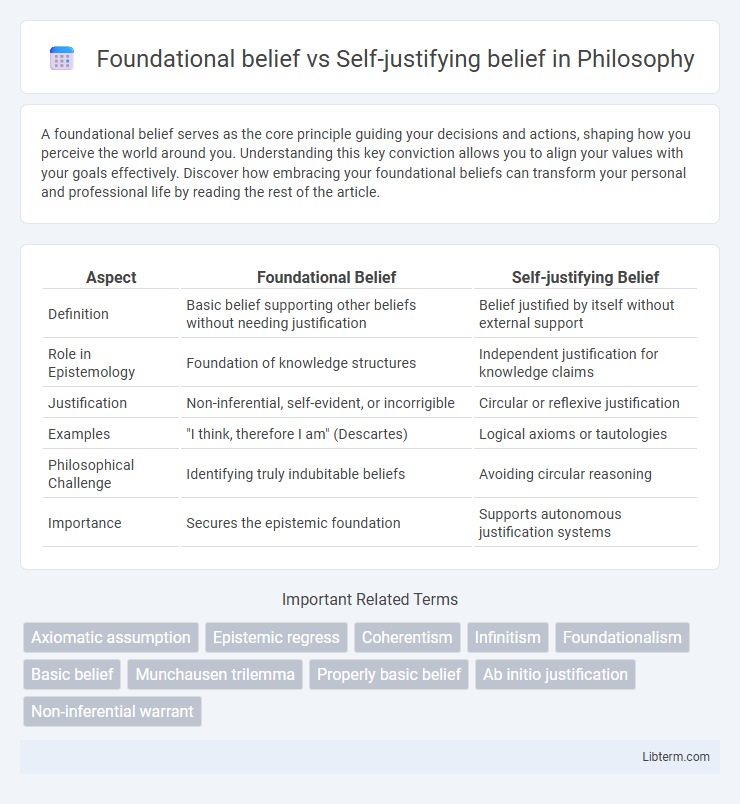A foundational belief serves as the core principle guiding your decisions and actions, shaping how you perceive the world around you. Understanding this key conviction allows you to align your values with your goals effectively. Discover how embracing your foundational beliefs can transform your personal and professional life by reading the rest of the article.
Table of Comparison
| Aspect | Foundational Belief | Self-justifying Belief |
|---|---|---|
| Definition | Basic belief supporting other beliefs without needing justification | Belief justified by itself without external support |
| Role in Epistemology | Foundation of knowledge structures | Independent justification for knowledge claims |
| Justification | Non-inferential, self-evident, or incorrigible | Circular or reflexive justification |
| Examples | "I think, therefore I am" (Descartes) | Logical axioms or tautologies |
| Philosophical Challenge | Identifying truly indubitable beliefs | Avoiding circular reasoning |
| Importance | Secures the epistemic foundation | Supports autonomous justification systems |
Understanding Foundational Beliefs
Foundational beliefs serve as the basic assumptions or core principles that do not require further justification and form the basis for all other knowledge claims. Understanding foundational beliefs is critical because they provide the epistemic grounding that supports coherent and consistent belief systems without falling into infinite regress. In contrast, self-justifying beliefs attempt to validate themselves, potentially leading to circular reasoning rather than offering a stable foundation for knowledge.
What Are Self-Justifying Beliefs?
Self-justifying beliefs are cognitive frameworks that validate themselves without requiring external evidence, often reinforcing an individual's existing worldview. These beliefs create a closed loop of reasoning, making them resistant to counterarguments and critical examination. Understanding self-justifying beliefs is crucial in fields like psychology and epistemology, as they influence decision-making, perception, and behavior by perpetuating confirmation bias and limiting openness to new information.
Key Differences Between Foundational and Self-Justifying Beliefs
Foundational beliefs serve as basic, self-evident principles that require no further justification and form the basis for other beliefs. Self-justifying beliefs rely on circular reasoning, where the belief's justification depends on the belief itself, undermining their epistemic validity. The key difference lies in foundational beliefs being epistemically secure and non-circular, while self-justifying beliefs lack independent support and depend on their own assertion for justification.
Philosophical Origins of Foundationalism
Foundational belief in foundationalism originates from Rene Descartes' quest for indubitable knowledge, where certain basic beliefs serve as secure foundations for all other knowledge. Self-justifying beliefs, alternatively, are those that provide their own justification without reliance on external evidence, reflecting internalist epistemology debates. These philosophical origins emphasize the necessity of grounding knowledge in certifiable truths to avoid infinite regress in justification.
The Role of Self-Justification in Epistemology
Self-justifying beliefs play a crucial role in epistemology by serving as foundational axioms that validate other beliefs without requiring external justification. Unlike foundational beliefs, which are typically self-evident or indubitable, self-justifying beliefs derive their justification through internal coherence and systemic support within a belief system. This dynamic underscores the significance of self-justification in maintaining the integrity and coherence of epistemic frameworks.
Examples of Foundational Beliefs in Daily Life
Foundational beliefs serve as the basic certainties that underpin our understanding of reality, such as the belief in the existence of an external world or the reliability of sensory experiences. For instance, when you trust that the sun will rise tomorrow or that other people have minds similar to yours, you are relying on foundational beliefs that do not require further justification. These beliefs contrast with self-justifying beliefs, which validate themselves through internal coherence or consistency rather than dependence on more basic truths.
Critiques of Self-Justifying Beliefs
Critiques of self-justifying beliefs emphasize their inherent circularity and lack of external validation, which undermines their epistemic reliability. These beliefs fail to provide a stable foundation for knowledge because they rely solely on their own justification without appeal to independent evidence or reasoning. Philosophers argue that self-justifying beliefs are vulnerable to skepticism since they do not escape the problem of infinite regress or foundational support that is addressed by foundational beliefs.
Interplay Between Foundational and Self-Justifying Beliefs
Foundational beliefs serve as basic, self-evident principles that underpin knowledge systems, while self-justifying beliefs derive their validity through internal coherence within those frameworks. The interplay between foundational and self-justifying beliefs creates a dynamic epistemic structure where foundational beliefs provide the bedrock for justificatory chains, and self-justifying beliefs reinforce and extend confidence in related propositions. Understanding this interaction is crucial for analyzing how knowledge claims maintain stability and adapt in response to new evidence or challenges.
Impacts on Reasoning and Decision-Making
Foundational beliefs serve as basic, self-evident truths that anchor reasoning by providing stable premises, enhancing coherence and reliability in decision-making. In contrast, self-justifying beliefs create circular reasoning, undermining objectivity and potentially leading to biased or flawed judgments. The distinction critically impacts cognitive processes, where foundational beliefs promote consistent logic, while self-justifying beliefs may distort evidence evaluation and hinder effective problem-solving.
Contemporary Debates: Foundational vs Self-Justifying Beliefs
Contemporary debates on foundational versus self-justifying beliefs center on whether certain basic beliefs inherently validate themselves or require external justification. Foundationalism argues that some beliefs, such as perceptual or logical beliefs, serve as secure bedrocks for knowledge without needing further proof. In contrast, proponents of self-justifying beliefs maintain that these beliefs possess intrinsic justification through their content or form, challenging traditional epistemic hierarchies and prompting reevaluations in theories of knowledge and justification.
Foundational belief Infographic

 libterm.com
libterm.com